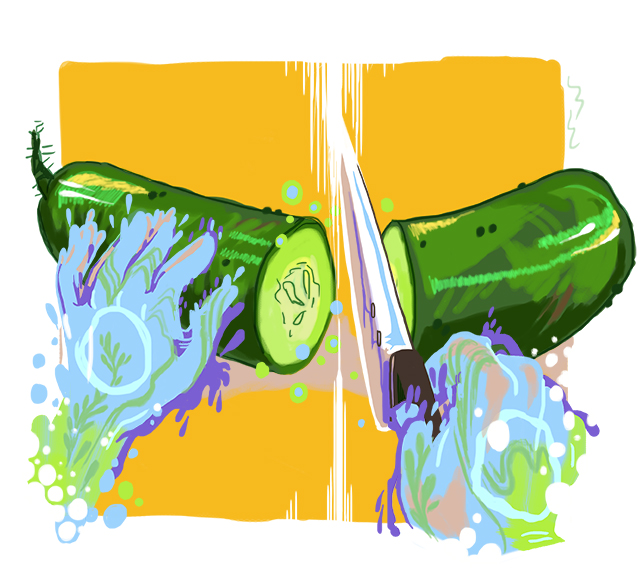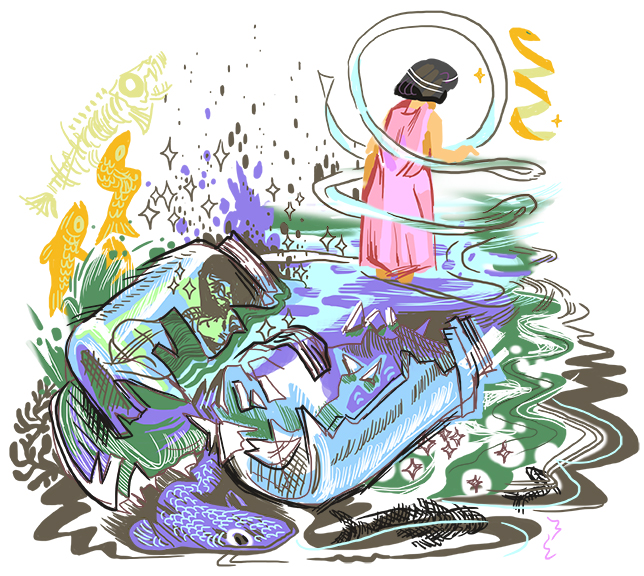For June, we present an original short story by Laura Chow Reeve, about three generations of women who wrestle with their memories in a unique way — by pickling them. We love the magical realism of the story, with rich imagery that elicits all senses, and a weight that we think many people can relate to.
-- Karissa Chen, Fiction & Poetry Editor
Popo taught me to pickle memories when I was thirteen. It’s just like cucumbers, radishes, cabbage. I learned to cut them into even squares. Memories cut like apples; the knife slides through their protective skin with a crisp snap. I packed them in jars filled with salt, sugar, vinegar, and water. Adding herbs and spices can distort, make them harder to swallow. “It’s a family secret,” she said to me. “It allows you to forget.”
“Forget what?” I asked.
“Anything. Forgetting does not come easily to the women in our family. We have our jars.”
“What are we trying to forget, Popo?”
“So many questions. Chop this into smaller pieces.”
We started with minor moments: (1) When I dropped my underwear on the floor of the changing room after swim practice at school and Abigail Kincaid picked it up and showed the whole class. (2) The time I tugged on a strange woman’s skirt in a Costco checkout line because I thought, for a second, that she was my mother. (3) A recurring nightmare of being alone in an abandoned building with no way to get out.
“How do you feel?” she asked after the lids were tightened.
It felt like clenching and unclenching my jaw, like a steady beat of tension and release. Instead of telling her I felt full and empty at the same time, I shrugged.
She never asks him about futures where he does not come back. She prays that he returns to her, but only when she is alone. She asks him what he would like for dinner. She prays that business will stay good before they go to bed. Their silence is steady and it endures. It is a silence they agreed to.
He travels back and forth between their apartment in San Francisco and Southern China. It is rare to have a husband whose body tastes like the Pacific Ocean. It is rare to have a husband made mostly of salt.
I was Popo’s daughter’s daughter, but our saltwater bond was stronger than blood. We exhausted my mother. “Ma, why are you teaching her that?” she asked. It was a grey Sunday morning and Popo was helping me pickle a few things. It had been a bad week and I didn’t want to remember any of it.
“Because you won’t,” Popo said.
“Do you have your own jars, Mom?” I asked. I had searched for them without any luck.
“No,” she said. Like Popo, my mother was good at shutting down conversations. There were so many times that she felt far away. My arms could never quite reach her.
“That’s not true, Anne,” Popo said. “We made you one or two when you were younger. You remember that.”
“Is that right?” Mom wasn’t looking at either of us. She was still holding a paper napkin she had used at breakfast. She was trying to smooth out the creases with her fingers. She opened her mouth to say something, but hesitated.
“Yes,” Popo said.
“I’m sick of this.” My mother’s fingers tore the napkin to pieces. “How come you decide what all of us remember or forget?” There was water in her eyes. I wanted to wipe it away for her, but I was afraid her tears would not be like mine. I was afraid my mother was not made of salt. “You know what, Ma?” she said. “I remember everything.”
The street outside their apartment is loud the way city streets tend to be. It drifts in through the open windows of their front room, and she lets it fill up the space he left behind. It sits in his favorite chair, the blue one next to the fireplace. After the sound of the city is well rested, it moves across the front room and embeds itself into the cracks in the floorboards. It touches all of his books and then settles into his side of the bed. She holds it as she falls asleep. She smells it the next morning in her hair. She keeps it there until the rest of the city wakes up and it makes its way outside again.
When he comes home, he shuts the windows and says he is tired of loud noises. He tells her how the ocean roars and the wind cracks. He tells her he has been looking forward to the silence of home.

My mother went through my room to find and display my jars on the kitchen counter. They confronted me when I got home from school, my mother and my jars. One day, after she had found five of them tucked in my sock drawer, she told me to sit down with her.
“I know Popo thinks this is best, but memories are important even when they are painful. I’m concerned about you,” she said. “Both of you.”
“I’m fine, Mom. Popo is fine,” I said.
“She’s not fine. I know she thinks she can control these things, but she can’t. Her short-term memory is getting worse. She forgets where she puts things, she doesn’t show up to appointments, she can’t even tell me what she had for breakfast some days. Popo isn’t fine.” Her voice was clear and calm, but it bounced inside my head until it ached. I looked at my jars on the kitchen counter and tried to remember what was in them. They could have been anyone’s jars. The liquid inside was murky, almost grey. I wanted to open them up. I wanted to push them off the ledge to see them break open.
“Do you really remember everything?” I asked her. I tried to remember stories about her before me, ones that she must have told me, but I couldn’t remember any.
“Nobody remembers everything,” she said.
“But you told Popo—”
“I was upset.”
“Tell me something then.”
We stayed at the kitchen table and she talked. When the darkness slipped into the room and sat down with us, my mother looked at my face. I couldn’t see her gaze through the dark – we hadn’t turned the lights on— but I could feel it on my skin. It felt determined and maybe like love.
Things she told me: Popo would prepare for Gung Gung’s homecomings with his favorite dishes— winter melon soup and salted duck. Popo would wear a pink dress on those days because she said Gung Gung was tired of the blues and greens of the ocean. Popo’s comforter was white and felt like velvet, even though it was only made of cotton. Popo would let my mother sleep with her when Gung Gung was away. My mother met my father when they both worked for an insurance company in downtown Sacramento. They were both already married, but my father asked my mother out for a drink one day after work and she said yes. Popo liked my father because he was really American, unlike my mother’s first husband who grew up in Chinatown like them. My parents loved each other so much that she was never hungry. When my father left without saying goodbye, my mother ate everything in the refrigerator and the pantry and the cupboards.
The memories came in pieces. Sometimes she stumbled, searched for something else to tell me. She wanted to fill the silence but didn’t have enough words. When she was done, she asked me how I felt, and I didn’t have the heart to tell her that it felt the same. It felt like clenching and unclenching my jaw, like a steady beat of tension and release. I felt full and empty at the same time.
She is less lonely now that she has Anne. She has something to hold onto when she walks through Chinatown, something to ground her to the sidewalk. She used to think that she would float away with nothing solid to hold her down. Now she walks with purpose.
She teaches Anne how to say apple and block in English. She does not talk to her in Cantonese. When she does not know the word she is looking for in English she says nothing.
As I got older, I filled my jars with the things I had been holding onto. It was a feeling larger than relief. I poured out jams, mayonnaise, and peanut butter. I clogged every drain in the house to create a space to put myself away.
(1) I chose to forget the song that was playing when I lost my virginity to a boy who changed the sheets right after. (2) I chose to forget the white woman at the grocery store who told me I was prettier because I wasn’t full Chinese. I chose to forget her hands in my hair. “You’re so lucky,” she said. (3) I chose to forget the men who leered at me when I walked down the street and the one who told me, “I’ve never had one like you before.” (4) I chose to forget how my mother looked after the spindled cancer cells settled into her body. (5) I chose to forget the woman on the bus who spoke to me in Cantonese, and how I did not know how to respond. I searched for words that someone should have taught me, and I couldn’t find them anywhere.
Popo never warned me not to let it become a habit, a practice, a daily ritual. Mom wasn’t around to count my jars, display them, remind me of things I had already forgotten, witness my slow dissolve. I made the pickling liquid in large batches. I bought sugar and vinegar in bulk. My jars overflowed and spilled onto my hands until they stung.
Every time he comes back, he feels more foreign. He says “néih hóu ma,” but she responds in English. She practices with Anne. She learns new words every day.
“One day Anne’s children will not know how to speak our language,” he tells her.
She wants to say, "Maybe that will be for the best. They will stop longing for things they cannot have. There will be no reason to leave. Not everyone can live in between things. Not everyone can survive being split into two. There are fish that die in saltwater.”
She drank a glass of saltwater every night before her evening prayers. When I asked why, she said it was a leftover habit from when my Gung Gung would travel. “He died on his way back to China. Did you know that?”
“You told me,” I said.
“I just wanted to make sure you didn’t forget.”
She poured salt into the bottom of an empty glass and then filled the glass with water at the kitchen sink. She took her time, drank it while she was reading a magazine. I never asked for a glass and she never offered.
“Popo?” I asked after her glass was washed and set down to dry. “What do you put in your jars?”
“I don’t remember,” she said. “That is their purpose.”
“But aren’t there things you wish you hadn’t forgotten?” I asked. She looked at me for a long time before she answered.
“No,” she said. Then she added in a softer voice, “Sometimes I think there are not enough jars in this city for me to fill.”

He is dying but refuses to die in America. “I am going home,” he says. “I cannot be buried here.” He makes the necessary travel arrangements. He plans to leave in only a few weeks.
“You are leaving me here,” she says to him.
“Yes.”
“What am I supposed to do without you?” she asks. “What about Anne?”
“What does it matter? I am dying either way.” He looks at her and smiles. “You don’t want my ghost to haunt you. It’s better for both of us if I go.”
“Yes,” she says. “You’re right.”
To guarantee that she is not haunted by her dead husband, she stuffs most of what she has of him into thirty-seven glass jars. She only leaves enough to tell her future grandchildren (1) his name, (2) his occupation, (3) where he was born, (4) where he died, (5) the saltiness of his breath.
She does not have a backyard to bury the rest of him, so she pushes him underneath her bed instead. The first night that she sleeps with them, she hears a steady humming that keeps her awake. It never goes away, and she never moves the jars. Instead, she learns to live with the hum until she forgets it is even there.
“Anne, grab me the measuring cups,” she said one afternoon.
“Popo,” I said. “I’m Katie. Anne was my mother.” Her eyebrows furrowed. She moved around me and grabbed the measuring cups for herself. The symptoms my mother had witnessed in Popo years before had only gotten worse. She was shriveling.
“Please stop. This is making you sick,” I said. She continued to measure and chop; she licked her index finger, dipped it into a bowl of salt in front of her, and then popped it back in her mouth to taste. I wanted to imitate her, feel the small grains on my own tongue, but I stopped myself.
“I’m close,” she said.
“Close to what? What else could you have to forget?” I slammed my hands on the counter. Her bowl of salt shook.
We stood in silence until she said, “I love you, but I wish I remembered how to say it the other way.”
“What do you mean?” I asked.
The tears on her face looked almost milky white.
“There was a way I used to say it. I don’t remember the words. I used to say it to someone,” she said. “Do you remember?”
“No, Popo,” I said. “I don’t.”
When she watches Katie, she does not put her down. Katie’s skin is soft underneath her fingertips and she wonders how much sadness this little body could take. She smells just like Anne did when she was a baby, but looks so different. There are only traces and they are harder to hold on to. She is half-ghost. If she puts Katie down she will disappear, and she will not be able to find her again. She holds onto her because this is not a thing she can let go of.
She finished dissolving seven years after mom died. By the end, her slow pickling process had picked up speed. Everything I loved became smaller and smaller until she started to break apart in my hands and fall through my permanently wrinkled fingertips. My memory was shaky. Most of the water in my body was salt. I no longer had difficulty forgetting; it came easily with or without a jar. Remembering was harder. It kept me awake at night.
As I packed up her home, I looked for all the places that Popo had put herself to rest. I walked through each room, sat on each chair, picked up each knickknack, ran my fingers over every book’s spine. I went through all of her drawers, her closets. I took every lid off of every box. Jars were hidden everywhere.
She was right. There hadn’t been enough jars in the city to hold everything she needed to put down. She had started to fill milk jugs and ice cream pints. Even her shampoo bottles and toothpaste tubes had memories stuffed inside them.
I laid them out in her living room. Floor space was scare. I balanced them on top of each other. They sank between couch cushions. One or two rolled behind the television. I played a childhood game to choose one: my mother said to pick the very best one and that is—
Like the others, its contents blurred in the murky liquid. I wanted to say that it looked familiar, but of course it didn’t. I pulled on the lid, but my hands kept slipping. I was too weak or the jar was too strong or whatever was inside didn’t want to be taken back. I threw it against the wall. The glass shattered, the liquid dripped to the floor, the memory clung to the paint. Its smell surprised me— orange peels and baby powder. Popo was holding my mother’s head in her lap, pushing her hair back with her hands, cooing to her softly. It was an intimacy that I hadn’t seen before, and a part of me wanted to push it back inside. The memory played in a loop, but each time something was slightly different. Sometimes Popo’s shirt was a different color, sometimes my mother’s head rested on her shoulder, sometimes my mother looked older or younger. I couldn’t pick it up entirely; it kept slipping out of my hands.
One by one, I opened the rest of them. Sometimes they smelled rancid, like death. These were ones of her travels from China, her first few years living in San Francisco, my mother’s sickness and funeral. Many of them smelled like the ocean, like Gung Gung’s seawater breath, like the smells that made up her heartbreak. The ones of me smelled like vanilla yogurt and strawberries.
The floor was wet. I lay down in the mess and let my clothes soak it all up. If they had been there, I would have told them this: (1) I still long for things I cannot have. (2) I am living in between things. I am not split in two. (3) We are drowning in all this saltwater.
***
Illustrations by Mori Walts.
Mori Walts is a queer Nikkei multimedia artist based out of Santa Rosa CA who is currently focusing their art on processing the imaginary Japan within the western imagination. They hope to pursue a career in animation.










Comments